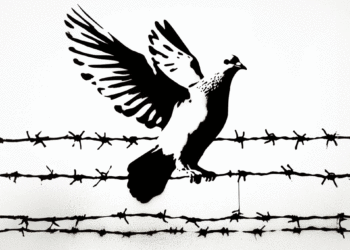By ALEX SINCLAIR / Haaretz
On Seder night, many of us both in Israel and abroad will leave an empty chair, place setting, and untouched glass of wine for Gilad Shalit.
By making this symbolic gesture at our Seder, we keep Gilad’s situation at the forefront of our consciousness and remind ourselves that at this celebration of freedom, one of our people remains in bondage: May he speedily return to the arms of his family.
By incorporating Gilad into our Seder in this way, we also transform Pesach itself. No longer is it only historical memory; it becomes a lived commentary on our contemporary situation. It is transformed from ritual to political activism.
Gilad’s empty chair at our Seder changes the way we understand our Judaism: It is not just a set of spiritual religious or cultural experiences, but rather a vibrant, insistent vision that demands to impinge on every aspect our lives.Seder night celebrates our freedom from Pharaoh’s oppression, but, in one of its most poignant moments, it also commemorates the tragedy that befell the Egyptians.
As we recount the 10 Plagues that decimated Egyptian society, we spill a drop of wine for each plague, to remind us of the Egyptian blood that was spilt.
The act of spilling the wine compels us to retain our humanity when we might understandably forget it.
As we whoop with joy that we achieved our freedom, we are commanded to feel sad at the loss of human life amongst our enemies.
We do not deny that this loss of life was necessary, but neither do we rejoice in that necessity. This segment of the Seder, teaching generations of Jews that Schadenfreude is the most un-Jewish of emotions, is one of Judaism’s finest hours.
To my mind, when we consider recent events in Gaza, we have no option but to transform the spilling of the wine from ancient ritual to contemporary commentary, just as we do with Gilad’s empty chair.
In addition to the drops of wine that we spill in sadness at the necessary loss of Egyptian life 3,000 years ago, we must also spill a drop of wine in sadness at the necessary loss of Gazan life 3 months ago.
To spill wine for Gazan life is not to deny the justness of the war, or to suggest that we should not do the same thing again when Israel’s security is threatened. Sadness over our enemies’ deaths need not come at the expense of our own convictions.
But the spilling of wine for Gazan life may help save our own humanity. Recent revelations about soldiers’ T-shirt slogans that show utter contempt for Palestinian life show just how far we have to go to re-educate ourselves.
This moment in the Seder should become more than ancient ritual: It should become commentary on the contemporary situation.
It should remind us that, even if the war in Gaza was necessary, even if Palestinian civilian casualties were unavoidable, even if we will need to do it all over again in the future, we must never, never, feel joy at the death of our enemies. The ideal situation is one in which we are free and they don’t die: that is what we strive for.
This Seder night, we should celebrate our own freedom; pray for Gilad Shalit’s; commemorate the Israelis who have died to safeguard our country; and spill a drop of wine to mourn the Palestinian blood that we have spilled in order to keep ourselves free. Our humanity and our Judaism demand nothing less.
(c) Haaretz



















